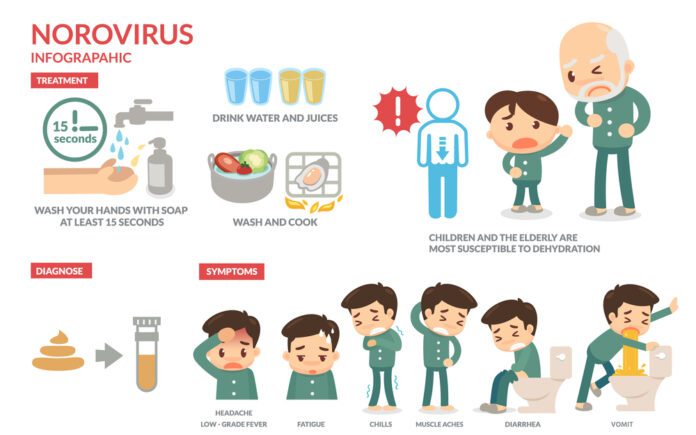Overview Of Norovirus
Norovirus is a virus (germ) that causes an infection of the stomach and intestines. Norovirus can spread easily in health care settings. Read on to learn how to prevent getting infected with norovirus if you’re in the hospital.
Commonly Associated With
Gastroenteritis – norovirus; Colitis – norovirus; Hospital-acquired infection – norovirus
Considerations
Symptoms start within 24 to 48 hours of infection and can last for 1 to 3 days. Diarrhea and vomiting can be severe, leading the body to not have enough fluids (dehydration).
Anyone can become infected with norovirus. Hospital patients who are very old, very young, or very ill are most harmed by norovirus illnesses.
Norovirus infection can occur at any time during the year. It can be spread when people:
- Touch objects or surfaces that have been contaminated, then put their hands in their mouths. (Contaminated means the norovirus germ is present on the object or surface.)
- Eat or drink something contaminated.
- It is possible to be infected with norovirus more than once in your life.
Most cases do not need testing. In some cases, testing for the virus is done to understand an outbreak, such as in a hospital setting. This test is done by collecting a stool or vomit sample and sending it to a lab.
Treatment Of Norovirus
Norovirus illnesses are not treated with antibiotics because antibiotics kill bacteria, not viruses. Receiving plenty of extra fluids through a vein (IV, or intravenous) is the best way to prevent the body from becoming dehydrated.
Symptoms most often resolve in 2 to 3 days. Although people may feel better, they can still spread the virus to others for up to 72 hours (in some cases 1 to 2 weeks) after their symptoms have resolved.
Prevention Of Norovirus
Hospital staff and visitors should always stay home if they feel sick or have a fever, diarrhea, or nausea. They should consult with their occupational health department at their institution. This helps protect others in the hospital. Remember, what may seem like a small health problem for you can be a big health problem for someone in the hospital who is already sick.
Even when there is no norovirus outbreak, staff and visitors must clean their hands often:
- Washing hands with soap and water prevents the spread of any infection.
- Alcohol-based hand sanitizers can be used between hand washing.
- People infected with norovirus are placed in contact isolation. This is a way to create barriers between people and germs.
- It prevents the spread of germs among the staff, patients, and visitors.
- Isolation will last 48 to 72 hours after symptoms have gone way.
Staff and health care providers must:
- Use proper garments, such as isolation gloves and a gown when entering an isolated patient’s room.
- Wear a mask when there is a chance of splashing bodily fluids.
- Always clean and disinfect surfaces patients have touched using a bleach-based cleaner.
- Limit moving patients to other areas of the hospital.
- Keep patient’s belongings in special bags and throw away any disposable items.
- Anyone visiting a patient who has an isolation sign outside their door should stop at the nurses’ station before entering the patient’s room.



